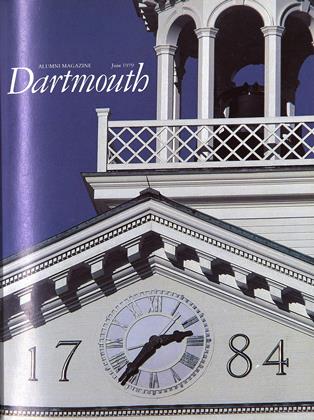Robert Jastrow, Adjunct Professor of Earth Sciences. God and the Astronomers. Norton, 1978. 136 pp. Readers familiar with Jastrow's previous efforts at translating the abstruse theories of modern astronomy into intelligible concepts and layman's language will know that he is not reluctant to swipe at sacred cows. Now he takes on one of the most sacred: those among his own colleagues, scientists all, who find themselves hostile to the implications of their own discovery, specifically the "Big Bang" theory. Whereas the now largely abandoned "Solid State" theory of cosmology assumed an eternal universe with no beginning and no end, the "Big Bang" implies a beginning, and therefore perhaps also a causal agent, the Primum Mobile of old. Theologians are delighted, scientists less so. Most agree, Jastrow says, with the English astronomer Eddington: "The idea of a beginning is repugnant." Yet there it stands, a clear implication of the scientists' own findings. Though a self-confessed agnostic in religious matters, Jastrow concludes: "For the scientist ... the story ends like a bad dream. He has scaled the mountains of ignorance; he is about to conquer the highest peak; as he pulls himself over the final rock, he is greeted by a band of theologians who have been sitting there for centuries."
John White '61, ed. Kundalini, Evolution, andEnlightenment. Anchor Books, 1979. 479 pp. A collection of some 40 essays by various hands exploring all aspects of the concept of "kundalini." The word is Sanskrit, the editor explains, and "means 'coiled up' like a snake or spring. It implies latent power or untapped potential — the possibility within each person of attaining a new and more fulfilling condition of life." The search for "cosmic contact, and knowledge of supersensible worlds" is widespread in today's world, White notes, and the answer proposed in this book is kundalini.
 View Full Issue
View Full Issue
More From This Issue
-
 Feature
Feature'We will all make whoopee'
June 1979 By Dick Holbrook -
 Feature
FeatureE – i – e – i – o
June 1979 By Marshall Ledger -
 Feature
FeatureExit with a Flourish
June 1979 By Beverly Foster -
 Feature
FeatureEncouraging growth, affirming the educational process
June 1979 By Robert Kilmarx -
 Article
ArticleCommencement
June 1979 By James L. Farley -
 Article
Article'Radical' with a Cause
June 1979 By Tim Taylor
Article
-
 Article
ArticleCAMPUS SQUIBS
June, 1923 -
 Article
ArticleDartmouth Awards Honorary Degrees to Ten
July 1950 -
 Article
ArticleFaculty Articles
February 1951 -
 Article
ArticleSecretary of the Year
June 1957 -
 Article
ArticleTwo Books on Teaching English Result from 1966 Dartmouth Seminar
FEBRUARY 1968 -
 Article
ArticleHockey's Top Arbitrator
April 2000 By Bill Kirtz

